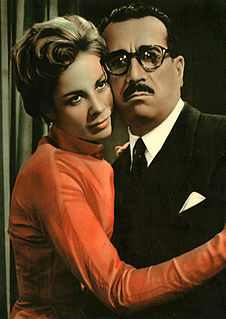This page is based on this
Wikipedia article Text is available under the
CC BY-SA 4.0 license; additional terms may apply.
Images, videos and audio are available under their respective licenses.

Peppino De Filippo was an Italian actor.

Davgata is a village in the island of Cephalonia, Greece. It is part of the municipal unit of Argostoli. It is situated on a mountain slope above the eastern shore of the Gulf of Argostoli, at about 300 m elevation. Davgata is 2 km southeast of Farsa, 2 km west of Dilinata and 5 km north of Argostoli. Davgata has a Museum of Natural History, opened in 1996. The mountaintop of Evmorfia, elevation 1,043 m, lies to the northeast. Davgata was severely damaged by the 1953 Ionian earthquake.

Giuseppe Nicolini was an Italian composer who wrote at least 45 operas. From 1819 onwards, he devoted himself primarily to religious music. He was born and died at Piacenza.
Giuseppe Farinelli was an Italian composer active at the end of the 18th century and the beginning of the 19th century who excelled in writing opera buffas. Considered the successor and most successful imitator of Domenico Cimarosa, the greatest of his roughly 60 operas include I riti d'Efeso, La contadina bizzarra and Ginevra degli Almieri. More than 2/3 of his operas were produced between 1800-1810 at the height of his popularity. With the arrival of Gioachino Rossini his operas became less desirable with the public, and by 1817 his operas were no longer performed. His other compositions include 3 piano forte sonatas, 3 oratorios, 11 cantatas, 5 masses, 2 Te Deums, a Stabat mater, a Salve regina, a Tantum ergo, numerous motets, and several other sacred works.

Adina is an operatic farsa in one act by Gioachino Rossini with a libretto by Marchese Gherardo Bevilacqua-Aldobrandini. The opera develops the popular theme of the "abduction from the seraglio".
The première took place on 22 June 1826 at the Teatro Nacional de São Carlos, Lisbon.

L'inganno felice is an opera in one act by Gioachino Rossini with a libretto by Giuseppe Maria Foppa.
Gaetano Rossi was an Italian opera librettist for several of the well-known bel canto-era composers including Gioachino Rossini, Gaetano Donizetti, and Saverio Mercadante in Italy and Giacomo Meyerbeer in one of his early Italian successes. Other composers with whom he worked included Simon Mayr, a composer and Donizetti's teacher, as well as the prolific Giovanni Pacini.

L'impresario in angustie is an operatic farsa in one act by composer Domenico Cimarosa with an Italian libretto by Giuseppe Maria Diodati. The opera premiered at the Teatro Nuovo in Naples, Italy in 1786.
Gennaro Astarita was an Italian composer, mainly of operas. The place of his birth is unknown, although he was active in Naples for many years. He began his operatic career in 1765, collaborating with Niccolò Piccinni in the writing of the opera L'orfana insidiata. He became the maestro di cappella in Naples in 1770.
Marcello Bernardini was an Italian composer and librettist. Little is known of him, save that he wrote 37 operas in his career. His father was most likely the composer Rinaldo di Capua.

Pietro Generali was an Italian composer primarily of operas and vocal music.

Teatro Grattacielo is a professional opera company based in New York City specializing in concert performances of rarely heard verismo operas. The company's past performances have included the North American premieres of Mascagni's Il piccolo Marat and Riccardo Zandonai's I cavalieri di Ekebù and La farsa amorosa. Its name means "Skyscraper Theatre" in Italian, a reference not only to the New York skyline but also to the Teatro Grattacielo in Genoa, a cinema which was the city's temporary opera house while the Teatro Carlo Felice was rebuilt after extensive damage in World War II.

Una follia is a farsa in one act by composer Gaetano Donizetti. The work premiered on 15 December 1818 at the Teatro San Luca in Venice. The opera uses the same Italian-language libretto by Bartolomeo Merelli after August von Kotzebue's Der Graf von Burgund that Donizetti used for his Enrico di Borgogna a month earlier, but with different music. It was given one performance and "never performed again, and its score has never been found."

La romanziera e l'uomo nero is an 1831 one-act farsa with music by Gaetano Donizetti and an Italian libretto by Domenico Gilardoni, possibly based on the 1819 play La donna dei romanzi by Augusto Bon. Other suggested sources include L'homme noir (1820) by Eugene Scribe and Jean-Henri Dupin and Le coiffeur et le perruquier (1824) by Scribe, Édouard-Joseph-Ennemond Mazères and Charles Nombret Saint-Laurent.
Che originali! is a 1798 farsa in one act by Simon Mayr for the Teatro San Benedetto. The libretto by Gaetano Rossi was based on an earlier French farce from 1779. It was the earliest of Mayr's works to be widely produced.

Maria Josina Elisabeth "Marja" Lubeck is a New Zealand politician and Member of Parliament in the House of Representatives for the Labour Party.









